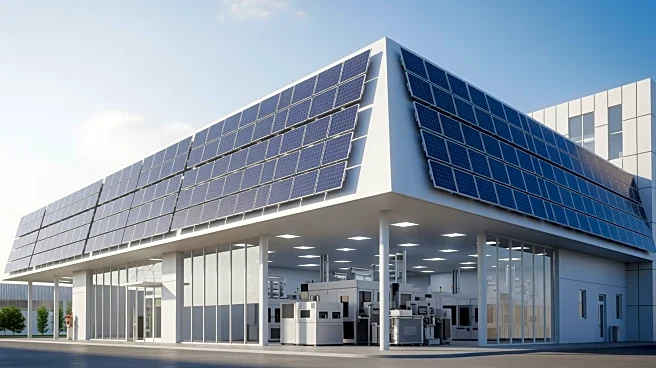What's Happening?
TSMC, the world's largest chip manufacturer, is expanding its semiconductor factory operations in Taiwan and potentially in America. This expansion is part of a broader commitment to renewable energy, as TSMC aims to meet the RE100 initiative by 2030.
The initiative requires companies to source 100% of their energy from renewable sources. Industry leaders at the Energy Taiwan & Net Zero Taiwan 2025 event emphasized the importance of solar energy in powering the chip manufacturing industry, which is crucial for AI data centers. The event highlighted the need for Taiwan to decarbonize its manufacturing processes to maintain its competitive edge in the global semiconductor market.
Why It's Important?
The expansion of TSMC's semiconductor factory with a focus on renewable energy is significant for several reasons. Firstly, it aligns with global efforts to reduce carbon emissions and combat climate change. Secondly, it positions Taiwan as a leader in sustainable manufacturing practices, which could enhance its reputation and competitiveness in the semiconductor industry. The move also reflects the growing demand for green energy solutions among tech giants like Apple and Nvidia, who are seeking power purchase agreements to ensure compliance with renewable energy commitments. This shift towards renewable energy could drive innovation and investment in the sector, benefiting both the environment and the economy.
What's Next?
TSMC's commitment to renewable energy is likely to influence other companies in the semiconductor industry to adopt similar practices. As Taiwan continues to implement regulations pushing large energy consumers towards renewables, we can expect increased investment in solar and energy storage solutions. Additionally, the European Union's carbon border adjustment mechanism may further drive commercial and industrial renewables deployment in Taiwan. The government's ambition to achieve 20 GW of deployed solar capacity by 2026 could create more domestic opportunities for manufacturers, despite challenges such as land-use debates and local government elections.
Beyond the Headlines
The focus on renewable energy in semiconductor manufacturing could have broader implications for global trade and environmental policies. As countries and companies strive to meet carbon reduction targets, the demand for sustainable manufacturing practices will likely increase. This could lead to shifts in trade policies, with countries favoring imports from manufacturers that adhere to strict environmental standards. Furthermore, the integration of AI and machine learning in energy management systems could optimize energy usage and reduce costs, making renewable energy more accessible and efficient.















